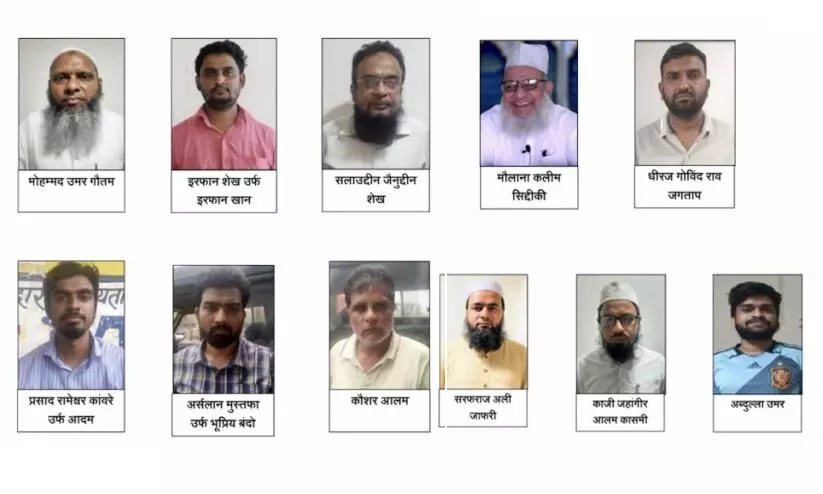
Flawed evidence, say lawyers of Muslims convicted for life in UP mass conversion case
text_fieldsThe case of mass conversion in Uttar Pradesh and the recent lower court order sentencing 12 people, including a prominent Islamic scholar, under the UP anti-conversion law—on the allegation of unlawfully converting Hindus to Islam under duress, which the accused denied in court—suggest that the Yogi government is compliant with Hindu groups conducting Ghar Wapsi and offering duress.
A Lucknow court found the individuals guilty of operating an interstate syndicate involved in the unlawful conversion of Hindus to Islam, the first major conviction under the Uttar Pradesh Prohibition of Unlawful Conversion of Religion Act, 2021 in UP, and sentenced 12 individuals to life and imposed a 10-year prison term on four other individuals, The Wire reported.
The 16 individuals convicted were charged under Sections 3, 5, and 8 of the Act, as well as various sections of the Indian Penal Code (IPC) related to promoting religious hatred, outraging religious sentiments, and cheating. Twelve of the convicts were also found guilty under Section 121A of the IPC, which pertains to waging war against the state.
Among those sentenced to life imprisonment are Maulana Kaleem Siddiqui, a renowned Islamic cleric, and Maulana Umar Gautam, a prominent Muslim preacher who ran the Islamic Da’wah Centre (IDC) in Delhi.
Gautam, who converted to Islam from a Hindu background, was accused by the Uttar Pradesh Anti-Terrorist Squad (ATS) of being the kingpin of the alleged conversion racket, while Siddiqui was described as the mastermind. Both individuals denied the charges of forced or unlawful conversions.
Gautam and his son Abdullah Umar were also convicted under Section 35 of the Foreign Contribution (Regulation) Act, 2010, for allegedly receiving large sums of money from foreign donors illegally. This funding was purportedly used to facilitate unlawful conversions and provide financial assistance to converts. The IDC India was accused of being a central hub for these activities.
The court's decision also included compensation for the victims of the unlawful conversions. Aditya Gupta and Mohit Chaudhary, the individuals affected by the alleged conversions, are to receive Rs 2 lakh each under the 2021 Act.
The convictions follow a series of investigations that began in June 2021, when the UP ATS arrested Gautam and Mufti Qazi Jahangir Alam Qasmi on charges related to mass conversions. These arrests were part of a broader crackdown that saw 17 individuals eventually charged. The case attracted significant attention due to its allegations of foreign funding, extremism, and attempts to alter demographic patterns through conversion.
The police alleged that the accused were converting Hindus to Islam through various inducements, including offers of jobs, money, and marriage, as well as psychological pressure. The prosecution also claimed that the accused targeted vulnerable groups, including women, minors, and those from weaker sections of society.
Further complicating the case were allegations that some accused were influenced by the extremist literature of Anwar Al-Awlaki, an American Islamic preacher linked to Al-Qaeda. This led to additional charges related to waging war against the government.
The court's ruling also addressed the issue of illegal foreign funding. Gautam and others were accused of receiving substantial amounts of money through hawala and other illicit means, which were allegedly used to support their conversion activities and maintain several illegally operated trusts.
In response to the verdict, legal representatives for the accused expressed strong dissatisfaction. They argued that the charges and evidence presented were flawed, with several legal and procedural discrepancies. Some defence lawyers highlighted that many of the conversions took place before the enactment of the 2021 law, questioning the applicability of the charges.
The case has sparked considerable debate, with critics accusing the Uttar Pradesh police of targeting Muslim preachers under the guise of enforcing the new conversion law. Despite the controversy, the Uttar Pradesh police have defended their actions, asserting that the convictions validate their claims and demonstrate that their investigation was based on concrete evidence.






















